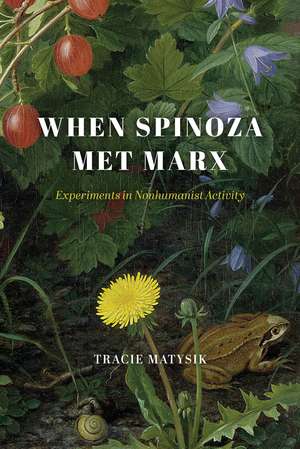When Spinoza Met Marx: Experiments in Nonhumanist Activity: The Life of Ideas
Autor Tracie Matysiken Limba Engleză Hardback – 23 ian 2023
Karl Marx was a fiery revolutionary theorist who heralded the imminent demise of capitalism, while Spinoza was a contemplative philosopher who preached rational understanding and voiced skepticism about open rebellion. Spinoza criticized all teleological ideas as anthropomorphic fantasies, while Marxism came to be associated expressly with teleological historical development. Why, then, were socialists of the German nineteenth century consistently drawn to Spinoza as their philosophical guide? Tracie Matysik shows how the metaphorical meeting of Spinoza and Marx arose out of an intellectual conundrum around the meaning of activity. How is it, exactly, that humans can be fully determined creatures but also able to change their world? To address this paradox, many revolutionary theorists came to think of activity in the sense of Spinoza—as relating. Matysik follows these Spinozist-socialist intellectual experiments as they unfolded across the nineteenth century, drawing lessons from them that will be meaningful for the contemporary world.
Preț: 270.78 lei
Nou
51.82€ • 54.03$ • 43.07£
Carte disponibilă
Livrare economică 27 februarie-13 martie
Livrare express 12-18 februarie pentru 41.34 lei
Specificații
ISBN-10: 0226822338
Pagini: 368
Dimensiuni: 152 x 229 x 28 mm
Greutate: 0.59 kg
Ediția:First Edition
Editura: University of Chicago Press
Colecția University of Chicago Press
Seria The Life of Ideas
Notă biografică
Tracie Matysik is associate professor of history at the University of Texas at Austin and a fellow of the Brian F. Bolton Professorship in Secular Studies. She is the author of Reforming the Moral Subject: Ethics and Sexuality in Central Europe, 1890–1930.
Cuprins
Abbreviations, Citational Shortcuts, and a Note on Translation
Preface
Introduction: When Spinoza Met Marx, or Activity in a Nonhumanist Key
Chapter 1. The Headless Revolution: Heinrich Heine’s Ethos of “Vigorous Repose”
Chapter 2. Love and Friendship: Berthold Auerbach and Moses Hess on Understanding and Activity
Chapter 3. When Marx Met Spinoza: Determination, Contingency, and Substance
Chapter 4. Spinoza against Bismarck, or Johann Jacoby and the Pursuit of Monist Democracy
Chapter 5. An Ethics of Natural Necessity: Jakob Stern, Free Thought, and German Social Democracy
Chapter 6. What Is “Nature”? Georgi Plekhanov and the Dilemmas of Consistent Materialism
Conclusion: The Persistence of Vigorous Repose
Acknowledgments
Notes
Bibliography
Index
Recenzii
Descriere
Explores concepts that bring together the thinking of Spinoza and Marx.
Karl Marx was a fiery revolutionary theorist who heralded the imminent demise of capitalism, while Spinoza was a contemplative philosopher who preached rational understanding and voiced skepticism about open rebellion. Spinoza criticized all teleological ideas as anthropomorphic fantasies, while Marxism came to be associated expressly with teleological historical development. Why, then, were socialists of the German nineteenth century consistently drawn to Spinoza as their philosophical guide? Tracie Matysik shows how the metaphorical meeting of Spinoza and Marx arose out of an intellectual conundrum around the meaning of activity. How is it, exactly, that humans can be fully determined creatures but also able to change their world? To address this paradox, many revolutionary theorists came to think of activity in the sense of Spinoza—as relating. Matysik follows these Spinozist-socialist intellectual experiments as they unfolded across the nineteenth century, drawing lessons from them that will be meaningful for the contemporary world.












